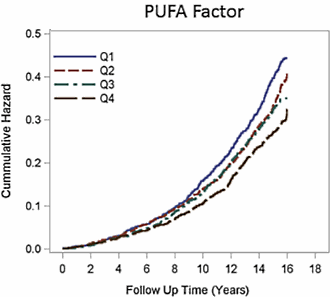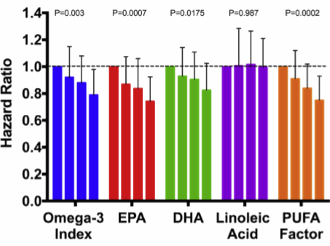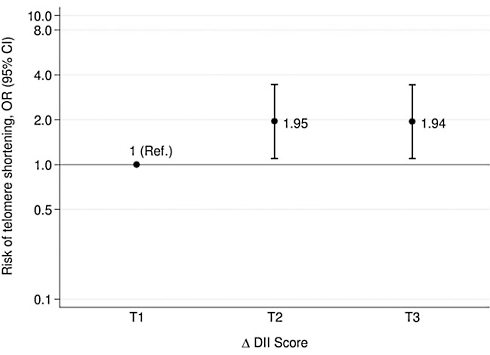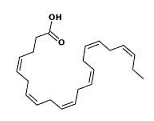|
Omega-3 fatty acids extend your life span
People who consume a relatively large amount of omega-3 fatty acids have longer telomeres than people who consume few omega-3 fatty acids. That means that their cells age more slowly. That's nice of course. But do you really see that anti-aging effect of omega-3 fatty acids when you look at the age that people actually are able to reach? Yes, a recent American study concludes.
Study
William Harris, a researcher affiliated with the University of South Dakota, used data that had been collected in the Women's Health Initiative Memory Study. Harris followed a group of 6501 women about 15 years. When the study started, the women were 65-80 years old. The researchers determined how many of which fatty acids were in the red blood cells of the women. Using that information, Harris divided the women into four equally large groups [quartiles; Q1-4].
Results
The more polyunsaturated fatty acids [PUFA Factor] the women had in their red blood cell, the smaller was their chance of death. Harris discovered the same relationship for the amount of omega-3 fatty acids in the blood cells [Omega-3 Index].


When the researchers corrected for of as many other factors as possible - such as age, ethnicity, BMI, education, smoking, alcohol consumption, physical activity, waist circumference and pre-existing chronic diseases such as diabetes, cancer and cardiovascular diseases, they discovered that the omega-3 fatty acids DHA and EPA reduced the risk of death, while the omega-6 fatty acids arachidonic acid and linoleic acid had no effect on mortality.

Mechanism
"Mechanisms that explain the associations between higher red blood cell n-3 PUFA and improved longevity are not clearly understood, but there are beneficial effects of n-3 PUFA on a variety of cardiovascular risk factors that may be involved", the researchers wrote.
"These include reductions in serum triglyceride levels, blood pressure, platelet aggregation, heart rate, susceptibility to ventricular fibrillation (in some settings), inflammatory markers, plaque vulnerability along with improvements in endothelial function. The observation that whole blood EPA and DHA levels are independently associated with slower rates of telomere shortening, a purported marker of cellular aging, is yet another favorable biomarker relationship, but it is not a molecular mechanism."
Conclusion
Suppose you are in the quartile with the lowest Omega-3 Index, and want to be in the fourth quartile. How could you manage that? According to the researchers, you should increase your daily intake of the omega-3 fatty acids DHA and EPA by 1 gram.
That "would require the daily consumption of about 2 to 3 oz [60 tot 90 gram] of salmon or about 1 pound of lower-fat seafood like chunk light tuna, shrimp, or flounder", the researchers wrote. "Alternatively, 3 standard (300 mg EPA 1 DHA) fish oil pills per day would suffice."
Source:
J Clin Lipidol. 2017 Jan - Feb;11(1):250-259.e5.
More:
Old, frail and ill? EPA may keep you alive 31.12.2017
Omega 3 fatty acids reduce cancer mortality 04.02.2015
Fish oil makes life more difficult for cancer secondaries 26.08.2012
Archives:
Fish Oil & Omega-3 Fatty Acids
Longevity
|
|







